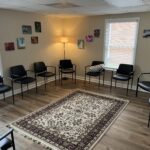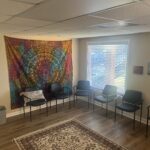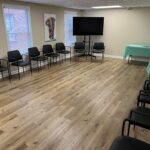Bipolar Disorder Treatment in Georgia
Bipolar disorder is a treatable mental health condition that affects many men in the United States. Our bipolar disorder treatment in Marietta, Georgia, is here to help.
Contact Hand in Hand Recovery Center today to treat your bipolar disorder.
Bipolar Disorder Treatment in Georgia
Bipolar disorder is a treatable mental health condition that affects many men in the United States. Our bipolar disorder treatment in Marietta, Georgia, is here to help.
Contact Hand in Hand Recovery Center today to treat your bipolar disorder.

Untreated bipolar disorder can result in extreme mood swings that make every day functioning a challenge. This can have devastating impacts on a person’s relationships and overall quality of life. Hand in Hand Recovery recognizes the complexities of bipolar disorder and sees the value in a comprehensive approach to recovery. Our bipolar disorder treatment in Georgia is specifically tailored to meet the needs of those coping with this condition so that they can achieve stability and healing on a long-term scale.
At Hand in Hand Recovery Center, we know how challenging it is for men to reach out for help. Our compassionate and caring team is here to give you the best and most effective treatment experience. Reach out today to begin our mental health treatment in Georgia.
What is Bipolar Disorder?
Characterized by rotating periods of mania and depression, bipolar is a serious mood disorder. As a result, those struggling with this disorder encounter intense changes in mood. Depressive episodes involve a lack of motivation, a deep sense of melancholy, and a loss of interest in activities or hobbies that an individual once enjoyed.
Alternatively, episodes of mania or hypomania are marked by irritability, euphoria, and a sudden surge in energy. This can lead to impulsive, often dangerous, behaviors.
According to Mental Health America, “About 1 in 40 American adults live with bipolar disorder.”
Because this condition is overall unpredictable, individuals with bipolar may struggle to have healthy relationships, achieve their goals, attend school regularly, or maintain a job. Sadly, for many of those with bipolar, it can hinder their ability to function in day to day life.
For this reason, it is imperative that effective bipolar treatment in Georgia be easily accessible to those in need.
Our Bipolar Disorder Treatment Programs in Georgia
We offer a full suite of programs crafted to meet the needs of those struggling with bipolar disorder at every stage of treatment. Our multi-faceted approach allows clients to work through the underlying causes of their condition and develop important coping mechanisms in an environment that best suits their recovery journey. The bipolar disorder treatment programs offered at Hand in Hand Recovery are outlined below.
Detox
It is not uncommon for those with bipolar disorder to also be struggling with drug or alcohol addiction. This is referred to as a dual diagnosis or co-occurring disorders. For the most successful treatment outcomes, the conditions should be treated simultaneously. Detox is typically the first treatment step for those struggling with substance use disorder as it allows clients to enter further programming without any drugs or toxins in their systems.
Residential Treatment
This type of program is also commonly referred to as inpatient rehab and involves clients living on-site. While in residential treatment, individuals are given 24/7 support and structure. This consistency and lack of communication with the outside world allows individuals to fully focus on their recovery.
Partial Hospitalization Program (PHP)
Those in our partial hospitalization program (PHP) attend treatment three to five days a week for several hours at a time. While in this program, they are able to live at home or in a sober living facility. Though participants do not reside at our center, they are still provided with an intensive level of care and ample support.
Intensive Outpatient Program (IOP)
Intensive outpatient programs (IOPs) are designed to provide clients with more flexibility than higher levels of care while offering more structure than standard outpatient programming. Those in our IOP typically go to treatment sessions three days a week for a few hours at a time.
Evening IOP
We understand that some clients may not be able to attend bipolar treatment during the day. For this reason, we offer an evening IOP that allows participants to work or attend school during regular hours. This program runs Monday, Wednesday, and Thursday from 6:00 PM to 9:00 PM.
Outpatient Program (OP)
Our outpatient program (OP) allows clients to assimilate back into their daily schedules at a comfortable and controlled pace. While in this program, clients continue to attend weekly sessions while spending more time with supportive family and friends, doing activities they enjoy, and upholding personal and professional responsibilities. In most cases, individuals enter this phase of treatment after completing more intensive levels of care.

Drug and alcohol addiction impact the lives of many men in the United States. When left untreated, addiction can negatively affect families and communities as well. However, there is hope for men who need recovery.
Reach out to Hand in Hand Recovery Center today and find your pathway to recovery.
Signs and Symptoms of Bipolar Disorder
Bipolar disorder can manifest through a variety of noticeable signs that both individuals and their loved ones should be aware of. These symptoms generally fall into two main groups—those linked to the manic phase and those tied to the depressive phase. When it comes to the depressive phase, the signs may include, but are not limited to, the following:
- Feeling hopeless, sad, or empty
- Lack of energy and motivation
- Difficulty concentrating
- Sleep disturbances (either insomnia or excessive sleeping)
- Loss of interest in once-enjoyed activities
- Feelings of guilt
- Being lethargic or restless
- Suicidal thoughts
- Shedding weight without dieting
- Overeating and gaining sudden weight
The symptoms typically associated with mania include:
- Being much more energetic or active than usual
- Becoming distracted easily
- Uncharacteristic irritability
- Making risky decisions such as gambling, shopping sprees, or random investments
- Shifting topics quickly or illogically
- Needing significantly less sleep than normal
- Racing thoughts
- Being more talkative than usual and speaking very quickly
- A false sense of confidence or well-being
How Do I Know I Need Treatment for Bipolar Disorder?
For someone displaying signs of bipolar disorder, professional help is essential to lead a happy, balanced, and fulfilling life. If you or a loved one suspects they may be dealing with this disorder, it’s critical to seek help as soon as possible. This condition can result in dangerous behaviors, which may have serious—even fatal—outcomes.
Those experiencing manic or depressive episodes often have trouble recognizing their behaviors. That’s why it’s important to get an evaluation—even if you’re unsure about having bipolar disorder. Additionally, it’s crucial to look out for those close to you who may be at risk.
While there’s no single cause of bipolar disorder, several factors may contribute to its development. These include genetic, biological, environmental, and psychological influences. In most cases, this condition emerges in late adolescence or early adulthood.
How We Treat Bipolar Disorder
We treat bipolar disorder in a peaceful environment focused on promoting whole-body healing and sustainable changes in thought patterns and behaviors. To accomplish this, we provide each of our clients with a personalized treatment plan. This plan is comprised of a combination of proven treatment interventions, holistic strategies, and experiential therapies. The overall goal of this plan is to meet each client’s specific needs while helping them achieve their treatment goals. Types of services individuals can expect to participate in while in our care include the following:
- Cognitive Behavioral Therapy (CBT): CBT assists those with bipolar disorder in recognizing and challenging the unhealthy thought patterns that can accompany manic and depressive episodes. Furthermore, it prepares them to more effectively manage their emotions, reduce impulsivity, and cope with the anxiety associated with sudden mood shifts.
- Dialectical Behavioral Therapy (DBT): DBT teaches techniques to regulate intense emotions and build resilience during mood swings. It also encourages individuals to accept the challenges associated with the disorder and, therefore, be overall more realistic and compassionate with themselves.
- Family Therapy: Family is an integral part of the recovery process. Family therapy allows loved ones to communicate openly so that they can better understand bipolar disorder and how to support those affected by it.
- Psychoeducational Groups: Psychoeducational groups provide individuals with bipolar disorder a supportive peer environment in which they can understand the impact of mood swings, share experiences, gain insights, and discuss healthy coping mechanisms.
- Experiential Therapy: While in experiential therapy, clients participate in activities that help them explore their feelings and behaviors. This practice can provide valuable insights into managing mood fluctuations.
- Trauma Therapy: Trauma therapy allows individuals to work through painful past events in a safe and nurturing atmosphere.
- Anger Management: Anger management courses help individuals with bipolar disorder to identify, control, and express their anger in healthy ways—especially in times of heightened emotions or mood swings.
- Life Skills: While in life skills training, individuals are taught practical ways to handle daily tasks, build resilience, and better their overall sense of self-sufficiency.
- Holistic Therapy: Holistic therapies center on healing a person’s mind, body, and spirit—not solely addressing their condition. Clients may participate in meditation, mindfulness practices, yoga, and nutritional guidance.
- Aftercare: Our bipolar disorder treatment in Georgia offers support even after a client has completed their formal recovery program. We offer ongoing therapy sessions, helpful resources, support groups, and opportunities for alumni.
Benefits of Gender-Specific Treatment
There are many benefits correlated with attending a bipolar disorder treatment program in Georgia that is specifically designed to meet the needs of men. At Hand in Hand Recovery, we believe in offering a safe space for men to focus on the unique obstacles they face in life and in treatment. For instance, societal expectations around masculinity, emotional suppression, and the stigma surrounding seeking help for mental health can make it tough for men to open up. This is why we have created a supportive environment where they can focus on their well-being free from these pressures.
Additionally, our men’s rehab program addresses challenges men often face such as anger, trauma, and substance use. This ensures that clients receive the support they need in an environment where they feel heard, valued, and motivated to overcome the difficulties associated with their mental health condition and reclaim purpose in their lives.
Find Bipolar Disorder Treatment in Georgia
With effective bipolar disorder treatment, symptom reduction is possible. Our compassionate and experienced team is prepared to equip you with vital coping mechanisms, unwavering support, and powerful resources so that you can live the fulfilling life you deserve. There is no need to continue struggling when you can start healing.
To learn more about Hand in Hand Recovery and the mental health services we provide, give us a call or visit our admissions page.

Are you struggling with an addiction? Hand in Hand Recovery Center can help. Our rehab programs help men find a path to recovery.
What is Bipolar Disorder?
Characterized by rotating periods of mania and depression, bipolar is a serious mood disorder. As a result, those struggling with this disorder encounter intense changes in mood. Depressive episodes involve a lack of motivation, a deep sense of melancholy, and a loss of interest in activities or hobbies that an individual once enjoyed.
Alternatively, episodes of mania or hypomania are marked by irritability, euphoria, and a sudden surge in energy. This can lead to impulsive, often dangerous, behaviors.
According to Mental Health America, “About 1 in 40 American adults live with bipolar disorder.”
Because this condition is overall unpredictable, individuals with bipolar may struggle to have healthy relationships, achieve their goals, attend school regularly, or maintain a job. Sadly, for many of those with bipolar, it can hinder their ability to function in day to day life.
For this reason, it is imperative that effective bipolar treatment in Georgia be easily accessible to those in need.
Our Bipolar Disorder Treatment Programs in Georgia
We offer a full suite of programs crafted to meet the needs of those struggling with bipolar disorder at every stage of treatment. Our multi-faceted approach allows clients to work through the underlying causes of their condition and develop important coping mechanisms in an environment that best suits their recovery journey. The bipolar disorder treatment programs offered at Hand in Hand Recovery are outlined below.
Detox
It is not uncommon for those with bipolar disorder to also be struggling with drug or alcohol addiction. This is referred to as a dual diagnosis or co-occurring disorders. For the most successful treatment outcomes, the conditions should be treated simultaneously. Detox is typically the first treatment step for those struggling with substance use disorder as it allows clients to enter further programming without any drugs or toxins in their systems.
Residential Treatment
This type of program is also commonly referred to as inpatient rehab and involves clients living on-site. While in residential treatment, individuals are given 24/7 support and structure. This consistency and lack of communication with the outside world allows individuals to fully focus on their recovery.
Partial Hospitalization Program (PHP)
Those in our partial hospitalization program (PHP) attend treatment three to five days a week for several hours at a time. While in this program, they are able to live at home or in a sober living facility. Though participants do not reside at our center, they are still provided with an intensive level of care and ample support.
Intensive Outpatient Program (IOP)
Intensive outpatient programs (IOPs) are designed to provide clients with more flexibility than higher levels of care while offering more structure than standard outpatient programming. Those in our IOP typically go to treatment sessions three days a week for a few hours at a time.
Evening IOP
We understand that some clients may not be able to attend bipolar treatment during the day. For this reason, we offer an evening IOP that allows participants to work or attend school during regular hours. This program runs Monday, Wednesday, and Thursday from 6:00 PM to 9:00 PM.
Outpatient Program (OP)
Our outpatient program (OP) allows clients to assimilate back into their daily schedules at a comfortable and controlled pace. While in this program, clients continue to attend weekly sessions while spending more time with supportive family and friends, doing activities they enjoy, and upholding personal and professional responsibilities. In most cases, individuals enter this phase of treatment after completing more intensive levels of care.

Drug and alcohol addiction impact the lives of many men in the United States. When left untreated, addiction can negatively affect families and communities as well. However, there is hope for men who need recovery.
Reach out to Hand in Hand Recovery Center today and find your pathway to recovery.
Signs and Symptoms of Bipolar Disorder
Bipolar disorder can manifest through a variety of noticeable signs that both individuals and their loved ones should be aware of. These symptoms generally fall into two main groups—those linked to the manic phase and those tied to the depressive phase. When it comes to the depressive phase, the signs may include, but are not limited to, the following:
- Feeling hopeless, sad, or empty
- Lack of energy and motivation
- Difficulty concentrating
- Sleep disturbances (either insomnia or excessive sleeping)
- Loss of interest in once-enjoyed activities
- Feelings of guilt
- Being lethargic or restless
- Suicidal thoughts
- Shedding weight without dieting
- Overeating and gaining sudden weight
The symptoms typically associated with mania include:
- Being much more energetic or active than usual
- Becoming distracted easily
- Uncharacteristic irritability
- Making risky decisions such as gambling, shopping sprees, or random investments
- Shifting topics quickly or illogically
- Needing significantly less sleep than normal
- Racing thoughts
- Being more talkative than usual and speaking very quickly
- A false sense of confidence or well-being
How Do I Know I Need Treatment for Bipolar Disorder?
For someone displaying signs of bipolar disorder, professional help is essential to lead a happy, balanced, and fulfilling life. If you or a loved one suspects they may be dealing with this disorder, it’s critical to seek help as soon as possible. This condition can result in dangerous behaviors, which may have serious—even fatal—outcomes.
Those experiencing manic or depressive episodes often have trouble recognizing their behaviors. That’s why it’s important to get an evaluation—even if you’re unsure about having bipolar disorder. Additionally, it’s crucial to look out for those close to you who may be at risk.
While there’s no single cause of bipolar disorder, several factors may contribute to its development. These include genetic, biological, environmental, and psychological influences. In most cases, this condition emerges in late adolescence or early adulthood.
How We Treat Bipolar Disorder
We treat bipolar disorder in a peaceful environment focused on promoting whole-body healing and sustainable changes in thought patterns and behaviors. To accomplish this, we provide each of our clients with a personalized treatment plan. This plan is comprised of a combination of proven treatment interventions, holistic strategies, and experiential therapies. The overall goal of this plan is to meet each client’s specific needs while helping them achieve their treatment goals. Types of services individuals can expect to participate in while in our care include the following:
- Cognitive Behavioral Therapy (CBT): CBT assists those with bipolar disorder in recognizing and challenging the unhealthy thought patterns that can accompany manic and depressive episodes. Furthermore, it prepares them to more effectively manage their emotions, reduce impulsivity, and cope with the anxiety associated with sudden mood shifts.
- Dialectical Behavioral Therapy (DBT): DBT teaches techniques to regulate intense emotions and build resilience during mood swings. It also encourages individuals to accept the challenges associated with the disorder and, therefore, be overall more realistic and compassionate with themselves.
- Family Therapy: Family is an integral part of the recovery process. Family therapy allows loved ones to communicate openly so that they can better understand bipolar disorder and how to support those affected by it.
- Psychoeducational Groups: Psychoeducational groups provide individuals with bipolar disorder a supportive peer environment in which they can understand the impact of mood swings, share experiences, gain insights, and discuss healthy coping mechanisms.
- Experiential Therapy: While in experiential therapy, clients participate in activities that help them explore their feelings and behaviors. This practice can provide valuable insights into managing mood fluctuations.
- Trauma Therapy: Trauma therapy allows individuals to work through painful past events in a safe and nurturing atmosphere.
- Anger Management: Anger management courses help individuals with bipolar disorder to identify, control, and express their anger in healthy ways—especially in times of heightened emotions or mood swings.
- Life Skills: While in life skills training, individuals are taught practical ways to handle daily tasks, build resilience, and better their overall sense of self-sufficiency.
- Holistic Therapy: Holistic therapies center on healing a person’s mind, body, and spirit—not solely addressing their condition. Clients may participate in meditation, mindfulness practices, yoga, and nutritional guidance.
- Aftercare: Our bipolar disorder treatment in Georgia offers support even after a client has completed their formal recovery program. We offer ongoing therapy sessions, helpful resources, support groups, and opportunities for alumni.
Benefits of Gender-Specific Treatment
There are many benefits correlated with attending a bipolar disorder treatment program in Georgia that is specifically designed to meet the needs of men. At Hand in Hand Recovery, we believe in offering a safe space for men to focus on the unique obstacles they face in life and in treatment. For instance, societal expectations around masculinity, emotional suppression, and the stigma surrounding seeking help for mental health can make it tough for men to open up. This is why we have created a supportive environment where they can focus on their well-being free from these pressures.
Additionally, our men’s rehab program addresses challenges men often face such as anger, trauma, and substance use. This ensures that clients receive the support they need in an environment where they feel heard, valued, and motivated to overcome the difficulties associated with their mental health condition and reclaim purpose in their lives.
Find Bipolar Disorder Treatment in Georgia
With effective bipolar disorder treatment, symptom reduction is possible. Our compassionate and experienced team is prepared to equip you with vital coping mechanisms, unwavering support, and powerful resources so that you can live the fulfilling life you deserve. There is no need to continue struggling when you can start healing.
To learn more about Hand in Hand Recovery and the mental health services we provide, give us a call or visit our admissions page.






